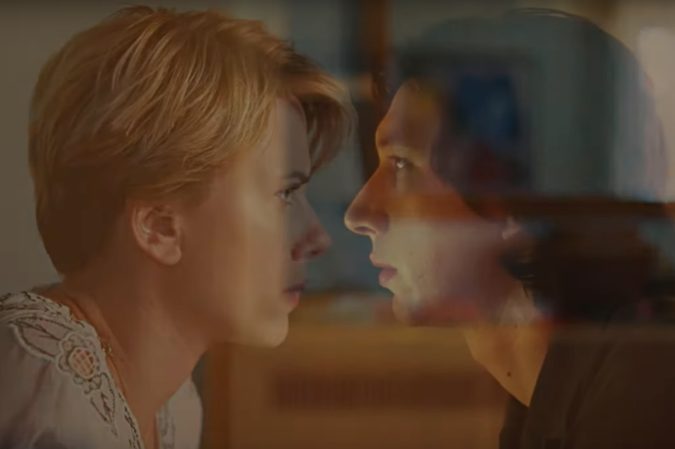An early scene in Marriage Story presents one perspective of the incipient divorce of the Barbers, Nicole (Scarlett Johansson) and Charlie (Adam Driver), in a way that calls attention to itself. Nicole is in the office of extreme false-modest super-lawyer Nora (Laura Dern) opening up to her about the separation over the course of an unbroken shot which rides the waves of her emotions, as she stands up and walks across the room while talking, the camera moves around with her. Nicole explains the life she and Charlie led before, their life in New York, with their son, Henry, and their work together in his theatre company (he director, she lead actor), and her move to the west coast.
It’s an extremely assured performance which leads the scene, and it sets the stage (maybe too literally) for a drama which will have other similarly huge moments, reached incrementally, buttressed by a ready swinging between tones. But after this round of soul-bearing, the film returns to Noah Baumbach’s usual melange of screwball-ish sequences with unreached pockets of sadness lurking beneath, where the sense goes on the ricochet around a room until someone’s feelings are finally activated (The serving of the divorce papers becomes one such moment). Even this paradigm can strike as too much of a good thing: the constant punchlines can be wearying.
Complications multiply from already complicated beginnings: Charlie’s based in New York (and he thinks Nicole and his son are too), he recently received a MacArthur Genius grant and is planning a production on Broadway; Nicole has landed a job on a TV pilot, opening up new career avenues near her birthplace in California. Charlie does end up hiring a lawyer as well, at first visiting Ray Liotta’s bulldoggish Jay, before opting for the softly-does-it approach of an older, kindly gentleman lawyer of his ex-mother-in-law’s acquaintance, played genially by Alan Alda. The point of the proceedings is to settle the question of custody: where will Henry stay, where will he go to school, who will be the main custodian?
The film gradually escalates up to a poisonous court-room confrontation where every secret is weaponised against the other party, and trust eviscerated; and after, into a genuine Bergman-quoting levelling of a confrontation in Charlie’s sparse new apartment, during which they spill their feelings onto the ground in a game of mutual self-respect deletion.
Baumbach’s scripts have always housed a certain amount of sophisticated dishonesty, which might seem like more than just your garden variety dishonesty, but it’s not: The Squid and the Whale and While We’re Young both attest to this. That’s in Marriage Story, too: especially in the case of the film’s cutesy ending, a bow-wrapping finish which patronises all involved.
The genuine ending of the film is in Adam Driver’s extraordinarily moving rendition of “Being Alive” from Steven Sondheim’s Company. The scene mirrors the structure of the song: it begins with the pronouncement of bemused self-pity, and as the vocal force progresses so does the feeling. This happens in Driver’s performance (augmented by the attention cinematographer Robbie Ryan pays to the inherent emotion in the architecture of the actor’s face) in miraculous ways: he begins the song, in a bar surrounded by colleagues and friends, performing detachedly; as the point presses home, the lyrics and his delivery of them start to explain his own situation, where and how he is presently. The song terminates with an exasperated exhalation: the breath of someone having come to an important self-realisation. Nicole and Charlie put each through hell, when they needed support, for being alive.
At Filmhouse Edinburgh until Thu Dec 5 2019.
